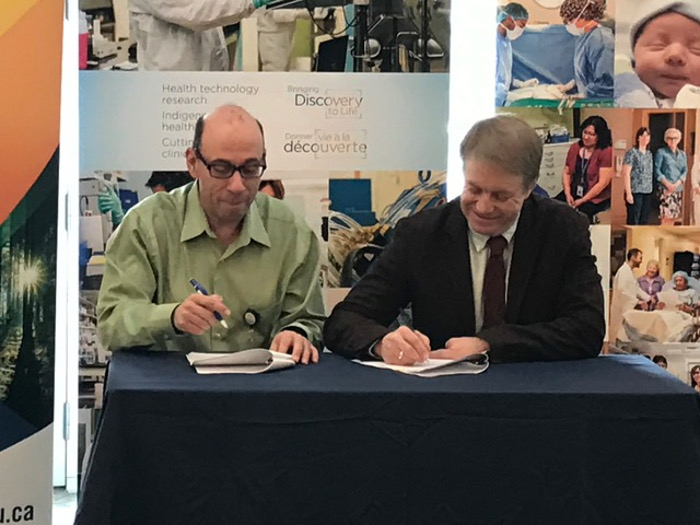New Ethics Approval Agreement Helps Streamline Local Research
The business of conducting research in Thunder Bay got a big boost recently thanks to a new agreement between Lakehead University and the Thunder Bay Regional Health Sciences Centre.
 The reciprocity agreement, signed April 1, 2017, harmonizes the ethics review process at and between both institutions for any research involving people. Compared to the two-board, two-application review system in place before, the new agreement has created a highly coordinated, faster, and more efficient process for researchers.
The reciprocity agreement, signed April 1, 2017, harmonizes the ethics review process at and between both institutions for any research involving people. Compared to the two-board, two-application review system in place before, the new agreement has created a highly coordinated, faster, and more efficient process for researchers.
With mutually agreed upon criteria that meets all the rigorous federal requirements, the new process means researchers can now apply for their ethics review by either institution’s panel – a significant change that eliminates costly and time-consuming duplication of effort.
“This new process came about out of our desire to ease researcher burden and combine our expertise at both institutions,” says Sue Wright, the Research Ethics and Administration Officer for Lakehead University. “Proposals no longer need to be approved by each separate panel to ensure they meet all the regulatory and ethical standards to proceed – all the same protection and ethical treatment of study participants is now guaranteed under a single review by either panel.”
In addition to leading the development of the new agreement for Lakehead, Wright is responsible for processing and recording all the paperwork for federal regulatory purposes, advising researchers and students on the new process, and staying in close communication with her counterparts at the health sciences centre.
“As we get used to this new process, there is still a large educational piece to implementing these changes,” says Wright. “I attend graduate student classes and faculty meetings to spread the word about the new process, and let people know where they can go for help and support for their ethics approval.”
Funded in part by the federal Research Support Fund, the ethics review process is an integral part of how both the university and the health sciences centre conduct their leading research. With more than 40 faculty members, their students, and dozens of staff jointly affiliated with both institutions, the new process will give a boost to local research and the economy.
Studies like clinical trials of new medicines or treatments, interviews and questionnaires with patients, and even shared training opportunities between institutions will be much faster to launch – a key part of ensuring that discoveries and developments arising from local research can be delivered sooner. Early feedback from researchers using the new review process has been overwhelmingly positive. A recent survey of the new process shows both faculty and students find the system “beneficial”, that it helps them “to move in a timely fashion’, and that “the Office of Research Services provides excellent assistance and guidance’.
“The spirit of collaboration leading up to the signing of the agreement is the real success story here,” says Anne Klymenko, Director of Research Services at Lakehead. “We now have a solid framework for mutually beneficial, streamlined ethics procedures that can be replicated with other partner organizations across Northern Ontario – it’s what the region needs to continue encouraging growth and development of clinical research and the knowledge economy”.
The new reciprocity agreement between Lakehead University and the Thunder Bay Regional Health Sciences Centre ensures their Research Ethics Boards follow Canada’s Tri-Council Policy Statement: Ethical Conduct for Research Involving Humans while reviewing each research project application.
The Research Support Fund is a federal funding program for post-secondary institutions in Canada to support some of the costs associated with managing research funded by the Canadian Institutes of Health Research, Natural Sciences and Engineering Research Council, and Social Sciences and Humanities Research Council. In 2018/19, Lakehead University is receiving nearly $2 million in assistance from the Research Support Fund to support the indirect costs of research, including intellectual property, research management and administration, ethics and regulatory compliance, research resources, and research facilities.

